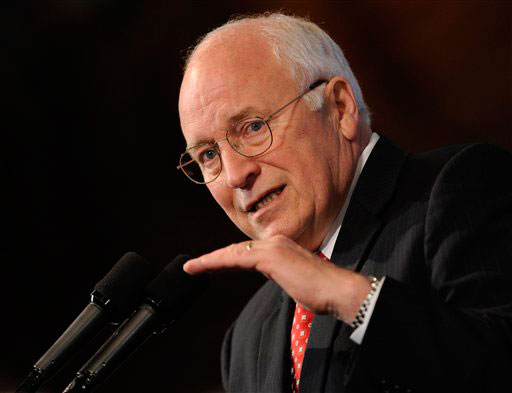CIA Documents Provide Little Cover for Cheney Claims
Newly released documents suggest non-abusive tactics worked.
Jul 31, 202011.1K Shares148.8K Views
Former Vice President Dick Cheney (Associated Press)
For months, former Vice President Dick Cheney has said that two documents prepared by the CIA, one from 2004 and the other from 2005, would refute critics of the Bush administration’s torture program. He told Fox’s Sean Hannity in April:
“„“I haven’t talked about it, but I know specifically of reports that I read, that I saw, that lay out what we learned through the interrogation process and what the consequences were for the country,” Cheney said. “I’ve now formally asked the CIA to take steps to declassify those memos so we can lay them out there and the American people have a chance to see what we obtained and what we learned and how good the intelligence was.”
Illustration by: Matt Mahurin
Those documents were obtained today by The Washington Independent and are available here. Strikingly, they provide little evidence for Cheney’s claims that the “enhanced interrogation” program run by the CIA provided valuable information. In fact, throughout both documents, many passages — though several are incomplete and circumstantial, actually suggest the opposite of Cheney’s contention: that non-abusive techniques actually helped elicit some of the most important information the documents cite in defending the value of the CIA’s interrogations.
The first document, issued by the CIA in July 2004 is about the interrogation of 9/11 architect Khalid Sheikh Mohammed, who was waterboarded 183 times in March 2003and whom,the newly released CIA Inspector General report on torture details,had his children’s lives threatened by an interrogator. None of that abuse is referred to in the publicly released version of the July 2004 document. Instead, we learn from the July 2004 document that not only did the man known as “KSM” largely provide intelligence about “historical plots” pulled off from al-Qaeda, a fair amount of the knowledge he imparted to his interrogators came from his “rolodex” — that is, what intelligence experts call “pocket litter,” or the telling documentation found on someone’s person when captured. As well, traditional intelligence work appears to have done wonders — including a fair amount of blundering on Khalid Sheikh Mohammed’s part:
“„In response to questions about [al-Qaeda's] efforts to acquire [weapons of mass destruction], [Khalid Sheikh Mohammed] revealed that he had met three individuals involved in [al-Qaeda's] program to produce anthrax. He appears to have calculated, incorrectly, that we had this information already, given that one of the three — Yazid Sufaat — had been in foreign custody for several months.
This is a far cry from torturing Khalid Sheikh Mohammed into revealing such information. It would be tendentious to believe that the torture didn’t have anyimpact on Khalid Sheikh Mohammed — he himself said that he lied to interrogators in order to get the torture to stop— but the document itself doesn’t attempt to present a case that the “enhanced interrogation” program was a factor, let alone the determinant factor, in the intelligence bounty the document says he provided.
The second newly released document — a June 2005 overview of information extracted from detainees — is, if anything, more caveated. In making a case that “detainee reporting” was “pivotal for the war against [al-Qaeda],” it says that “detainee reporting is often incomplete or too general to lead directly to arrests; instead, detainees provide critical pieces to the puzzle, which, when combined with other reporting, have helped direct an investigation’s focus and led to the capture of terrorists.” Khalid Sheikh Mohammed is the prime example here.
The document also discusses unraveling the network of Indonesian al-Qaeda affiliate Hambali after Khalid Sheikh Mohammed’s capture. There are repeated references to the value of “debriefings,” which the 2004 CIA inspector general’s report says are distinctfrom the “enhanced interrogation techniques” but can be used after they occur. For instance, “Debriefings of mid-level [al-Qaeda] operatives also have reported on specific plots against U.S. interests.” Indeed, in a section titled “Aiding Our Understanding [al-Qaeda],” a listed example is:
“„Abu Zubaydah’s identification early in his detention of [Khalid Sheikh Mohammed] as the mastermind of 11 September and [al-Qaeda's] premier terrorist planner and of ‘Abd al-Rahim al-Nashiri as another key [al-Qaeda] operational planner corroborated information [REDACTED].
Those revelations, as former Abu Zubaydah interrogator Ali Soufan has testified, came beforeAbu Zubaydah was tortured.
Similarly, the document contains accounts of how interrogators performed the traditional interrogation labors of cross-checking detainees’ accounts with each other to determine veracity, and particularly when cross-referenced with “large volumes of documents and computer data”:
“„For example, lists of names found on the computer [REDACTED] — a key [al-Qaeda] financial operative and facilitator for the 11 September attacks — seized in March 2003 represented [al-Qaeda] members who were to receive funds. Debriefers questioned detainees extensively on the names to determine who they were and how important they were to the organization. The information [REDACTED] helped us to better understand al-Qa’ida’s hierarchy, revenues, and expenditures, [REDACTED] as well as funds that were available to families.
Again, perhaps the blacked-out lines of the memos specifically claim and document that torture and only torture yielded this information. But what’s released within them does not remotely make that case. Cheney’s public account of these documents have conflated the difference between information acquired from detainees, which the documents present, and information acquired from detainees through the* enhanced interrogation program*, which they don’t.
In a statement, Tom Parker, the policy director of Amnesty International’s American branch, said, “Perhaps unsurprisingly, given Vice President Cheney’s track record, the two CIA memos released today are hardly the slam dunk we had been led to expect. There is little or no supporting evidence in either memo to give substance to the specific claims about impending attacks made by Khaled Shaik Mohammed in highly coercive circumstances.”
–

Rhyley Carney
Reviewer
Latest Articles
Popular Articles

